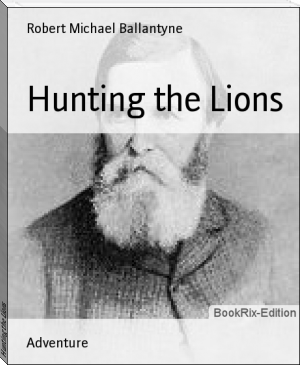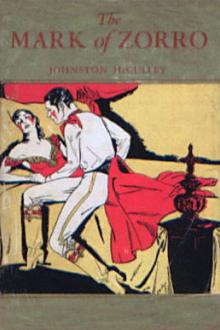Hunting the Lions - Robert Michael Ballantyne (best ebook reader ubuntu TXT) 📗

- Author: Robert Michael Ballantyne
Book online «Hunting the Lions - Robert Michael Ballantyne (best ebook reader ubuntu TXT) 📗». Author Robert Michael Ballantyne
Of course the hunters of the party were constantly on the alert, and great was the slaughter done; but great also was the capacity of the natives for devouring animal food, so that very little of the sport could be looked upon in the light of life taken in vain.
Huge and curious, as well as beautiful, were the creatures "bagged."
On one occasion Tom Brown went out with the rest of the party on horseback after some elephants, the tracks of which had been seen the day before. In the course of the day Tom was separated from his companions, but being of an easy-going disposition, and having been born with a thorough belief in the impossibility of anything very serious happening to him, he was not much alarmed, and continued to follow what he thought were the tracks of elephants, expecting every moment to fall in with, or hear shots from his friends.
During the journey Tom had seen the major, who was an old sportsman, kill several elephants, so that he conceived himself to be quite able for that duty if it should devolve upon him. He was walking his horse quietly along a sort of path that skirted a piece of thicket when he heard a tremendous crashing of trees, and looking up saw a troop of fifty or sixty elephants dashing away through a grove of mapani-trees. Tom at once put spurs to his horse, unslung his large-bore double-barrelled gun, and coming close up to a cow-elephant, sent a ball into her behind the shoulder. She did not drop, so he gave her another shot, when she fell heavily to the ground.
At that moment he heard a shot not far off. Immediately afterwards there was a sound of trampling feet which rapidly increased, and in a few moments the whole band of elephants came rushing back towards him, having been turned by the major with a party of natives. Not having completed the loading of his gun, Tom hastily rode behind a dense bush, and concealed himself as well as he could. The herd turned aside just before reaching the bush, and passed him about a hundred yards off with a tremendous rush, their trunks and tails in the air, and the major and Wilkins, with a lot of natives and dogs, in full pursuit. Tom was beginning to regret that he had not fired a long shot at them, when he heard a crash behind him, and looking back saw a monstrous bull-elephant making a terrific charge at him. It was a wounded animal, mad with rage and pain, which had caught sight of him in passing. Almost before he was aware of its approach it went crashing through the thicket trumpeting furiously, and tearing down trees, bushes, and everything before it.
Tom lay forward on the neck of his steed and drove the spurs into him. Away they went like the wind with the elephant close behind. In his anxiety Tom cast his eyes too often behind him. Before he could avoid it he was close on the top of a very steep slope, or stony hill, which went down about fifty yards to the plain below. To rein up was impossible, to go down would have been almost certain death to horse and man. With death before and behind, our hero had no alternative but to swerve, for the trunk of the huge creature was already almost over the haunch of his terrified horse. He did swerve. Pulling the horse on his haunches, and swinging him round at the same moment as if on a pivot, he made a bound to the left. The elephant passed him with a shriek like that of a railway engine, stuck out its feet before it, and went sliding wildly down the slope--as little boys are sometimes wont to do--sending dust, atones, and rubbish in a stupendous cloud before him. At the foot he lost his balance, and the last that Tom saw of him was a flourish of his stumpy tail as he went heels over head to the bottom of the hill. But he could not stop to see more; his horse was away with him, and fled over the plain on the wings of terror for a mile in the opposite direction before he consented to be pulled up.
Tom's companions, meanwhile, had shot two elephants--one a cow, the other a pretty old calf, and on their way back to camp they killed a buffalo. The other hunters had been also successful, so that the camp resounded with noisy demonstrations of joy, and the atmosphere ere long became redolent of the fumes of roasting meat, while the black bodies of the natives absolutely glittered with grease.
On summing up the result of the day's work, it was found that they had bagged six elephants, three elands, two buffaloes, and a variety of smaller game.
"A good bag," observed the major as he sipped his tea; "but I have seen better. However, we must rest content. By the way, Pearson, they tell me you had a narrow escape from a buffalo-bull."
"So I had," replied Pearson, pausing in the midst of a hearty meal that he was making off a baked elephant's foot; "but for Anson there I believe it would have been my last hunt."
"How did he help you?" asked Tom Brown.
"Come, tell them, Anson, you know best," said Pearson; "I am too busy yet to talk."
"Oh, it was simple enough," said Anson with a laugh. "He and I had gone off together after a small herd of buffaloes; Ogilvie and Brand were away following up the spoor of an elephant. We came upon the buffaloes unexpectedly, and at the first shot Pearson dropped one dead--shot through the heart. We were both on foot, having left our horses behind, because the ground was too stony for them. After a hard chase of two hours we came up with the herd. Pearson fired at a young bull and broke its leg, nevertheless it went off briskly on the remaining three, so I fired and shot off its tail. This appeared to tickle his fancy, for he turned at once and charged Pearson, who dropped his gun, sprang into a thorn-tree and clambered out of reach only just in time to escape the brute, which grazed his heel in passing. Poor fellow, he got such a fright--"
"False!" cried Pearson, with his mouth full of meat.
"That he fell off the tree," continued Anson, "and the bull turned to charge again, so, out of pity for my friend, I stopped him with a bullet in the chest."
"It was well done, Anson, I'm your debtor for life," said Pearson, holding out his plate; "just give me a little more of that splendid foot and you'll increase the debt immeasurably; you see the adventure has not taken away my appetite."
As he said this a savage growl was heard close to the wagon beside which they were seated. It was followed by a howl from one of the dogs. They all sprang up and ran towards the spot whence the sound came, just in time to see a panther bounding away with one of the dogs. A terrific yell of rage burst from every one, and each hastily threw something or other at the bold intruder. Pearson flung his knife and fork at it, having forgotten to drop those light weapons when he leaped up. The major hurled after it a heavy mass of firewood. Hardy and Hicks flung the huge marrow bones with which they happened to be engaged at the time. Tom Brown swung a large axe after it, and Wilkins, in desperation, shied his cap at it! But all missed their mark, and the panther would certainly have carried off his prize had not a very tall and powerfully-built Caffre, named Mafuta, darted at it an assegai, or long native spear, which, wounding it slightly, caused it to drop its prey.
The poor dog was severely hurt about the neck; it recovered, however, soon afterwards. The same night on which this occurred, one of the oxen was killed by a lion, but although all the people were more or less on the alert, the monarch of the woods escaped unpunished.
At an early hour next morning the train of wagons got into motion, and the hunters went out to their usual occupation.
CHAPTER FOUR.
TOM SEES WONDERFUL SIGHTS, AND AT LAST HAS HIS DREAMS FULFILLED.
Thus the travellers advanced day by day--sometimes in sunshine, sometimes in rain, now successful in hunting and now unsuccessful--until they reached the Zulu country and the banks of the river Umveloose.
Here they called a halt for a time, and began to hunt vigorously in all directions, aiming at every species of game. Our hero's first introduction to the river scenery was interesting, to himself at least, and singular. Having placed himself at the disposal of his friends to be appointed to whatever duty they pleased, he was sent off in the small boat belonging to the party with plenty of ammunition and provisions; Lieutenant Wilkins being his companion, and the tall Caffre, Mafuta, his guide and instructor in African warfare against the brute creation.
Between Tom Brown and this man Mafuta there had sprung up a species of friendship, which grew stronger the more they became acquainted with each other. Mafuta was an unusually honest, affectionate and straightforward Caffre, who had been much in the settlements, and could speak a little English. He first drew forth our hero's regard by nursing him with almost womanly tenderness during a three-days' severe illness at the beginning of the journey. Thereafter Tom gained his affection by repeated little acts of kindness, done in a quiet, offhand, careless way, as though he had pleasure in being kind, and did not care much whether the kindness were appreciated or not. He also excited his admiration by the imperturbable coolness and smiling good-humour with which he received every event in life; from the offer of an elephant steak to the charge of a black rhinoceros. Mafuta was also fond of Wilkins; but he worshipped Tom Brown.
On reaching the river the boat was launched on a part where there was nothing particularly striking to merit notice, so Tom said: "D'you know, Bob, I've taken a fancy to ramble alone for an hour along the banks of this river; will you, like a good fellow, get into the boat with Mafuta, and let me go along the banks on foot for a few miles. As your work will only be dropping down stream, you won't find it hard."
"By all means, Tom; a pleasant journey to you but see that you don't fall into the jaws of a lion or a crocodile!"
Our hero smiled as he waved his hand to his companions, and, turning away, was soon lost to sight among the bushes.
Now the fact was that Tom Brown, so far from being the unromantic creature that his name is erroneously supposed to imply, had such a superabundance of romance in his composition that he had, for some time past, longed to get away from his companions, and the noise and bustle of the wagon train, and go off alone into the solitudes of the great African wilderness, there to revel in the full enjoyment of the fact that he was in reality far far away from





Comments (0)